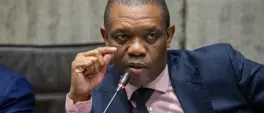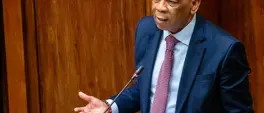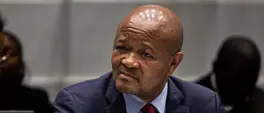MANDLA SHIKWAMBANA: Govt’s lack of will to improve education is why we need the BELA Act
Mandla Shikwambana
15 January 2025 | 10:31Every delay of implementing the act allows the perpetuation of systemic racism, leaving countless learners without placements at the beginning of every academic year, writes Mandla Shikwambana.
The reopening of schools this January presents yet another painful reminder of the dire state of basic education in South Africa.
As the Economic Freedom Fighters (EFF), we launched the #UmntanaEskolweni campaign, not as an annual ritual, but as a revolutionary call to action against the systemic failures that continue to condemn millions of learners to a lifetime of poverty and inequality.
Education in South Africa is in crisis, and the numbers tell a grim story.
Most young learners in South Africa cannot read for meaning, and we trail behind the rest of the world in science education, despite having one of the biggest budgets allocated to education. This means that many of our children are being set up for failure in a world that increasingly demands critical thinking, literacy, and advancement in science, technology, engineering, and mathematics (STEM).
Despite a constitutional promise of free and quality education, our public schools remain sites of neglect, dysfunction, and despair, while the privileged few enjoy private institutions that resemble global standards.
Every January, chaos reigns as thousands of learners fail to find placement in schools. This recurring crisis is not a matter of poor planning but a consequence of deliberate neglect.
The government’s failure to build new schools, particularly in townships and rural areas, exacerbates the overcrowding that already defines most classrooms. In provinces like Gauteng and the Eastern Cape, classrooms with over 50 learners have become the norm, while teachers struggle to meet the educational needs of their students without adequate resources.
The lack of infrastructure is glaring. More than 3,000 schools across South Africa still rely on pit toilets, endangering the safety and dignity of learners.
Some learners still walk for hours to reach their schools because the government has failed to deliver on promises of scholar transport. Where transport is provided, corruption is rife, with inflated contracts enriching tenderpreneurs while children’s lives are risked by travelling unsafe vehicles.
Corruption is also rampant in school nutrition programmes, which should be a lifeline for millions of impoverished children. Already serving a dire need in most communities in South Africa, as malnutrition rates amongst children are rising sharply, these meals for learners are sometimes the only meals they receive, and the only place where adequate nutrition is provided.
However, these programmes have become feeding troughs for the politically connected. Last year, reports emerged of substandard food being provided to learners, leaving children hungry in a system that already fails to nurture their potential.
The effects of these systemic failures go beyond academics. Mental health among young people is declining at an alarming rate, worsened by bullying, violence in schools, and the hopelessness of poverty. High rates of school bullying and an increasing rate of violence are a crisis the Department of Basic Education has largely ignored. Without intervention, these issues will continue to rob children of their potential and dignity.
The recent Basic Education Laws Amendment (BELA) Act could have been a step forward in addressing some of these systemic challenges, particularly by dismantling discriminatory practices in school admissions and language policies.
However, the African National Congress (ANC) Democratic Alliance (DA) coalition has weaponised bureaucracy to delay its implementation, further entrenching inequality. The delays reveal a sinister truth: this government lacks the political will to transform education, preferring instead to maintain a system that benefits the elite at the expense of the majority.
The BELA Act is a vital piece of legislation that seeks to dismantle exclusionary practices in South Africa’s education system. For too long, school governing bodies (SGBs) have weaponised language and admission policies to create racial enclaves, systematically excluding Black learners from well-resourced schools.
The BELA Act transfers control of these policies to provincial education departments, ensuring that decisions about school admissions and language policies are guided by principles of inclusivity rather than the entrenched interests of a privileged minority. It also compels schools to respect the cultural and religious practices of all learners, creating an environment where diversity is celebrated rather than suppressed.
The urgency of implementing the BELA Act cannot be overstated. Every delay allows the perpetuation of systemic racism, leaving countless learners without placements at the beginning of every academic year. The EFF remains committed to fighting for the act’s full implementation without delay.
Education is the cornerstone of economic freedom, and without it, we cannot hope to build a just society. It is shameful that 30 years into democracy, South Africa’s education system remains one of the most unequal in the world. Yet, there is hope for education to become a tool for liberation rather than oppression.
The EFF’s #UmntanaEskolweni campaign is therefore a necessary intervention at this time of year. We have directed all our representatives to adopt a school, provide oversight on schools within their regions and districts by assessing their state of readiness for this new school year, and intervene where necessary.
The fight for education is the fight for dignity, equality, and opportunity. Let us ensure that no child is left behind and that the classrooms of South Africa become places of hope, empowerment, and transformation.
Mandla Shikwambana is an EFF Member of Parliament.
Get the whole picture 💡
Take a look at the topic timeline for all related articles.
Trending News
More in Opinion

17 October 2025 12:54
MALAIKA MAHLATSI | Ntshavheni’s alarming constitutional delinquency, inhumanity and impunity

17 October 2025 12:42
CHRIS OXTOBY & JUDITH FEBRUARY | JSC interviews – Showing a challenging road ahead?

15 October 2025 14:59
CHARLES MATSEKE | South Africa’s quiet privatisation and the birth of an Oligopoly












